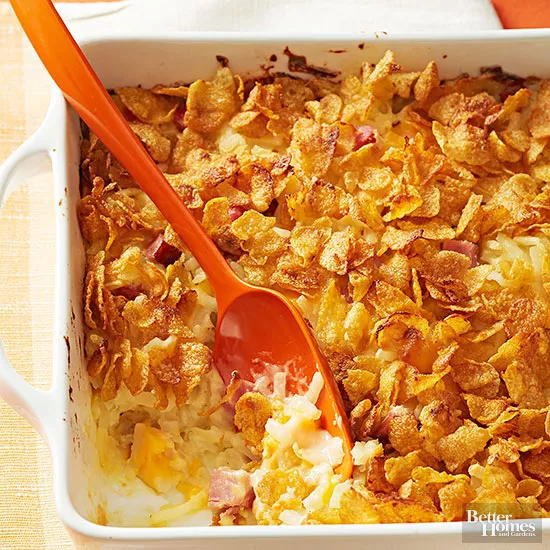Hash Brown Casserole Recipe

When it comes to comfort food, there may be nothing as perfect as a homemade casserole. This hash brown casserole, which mixes frozen hash browns, American cheese, and a few other ingredients, including crunchy cornflakes, might be the most old-school goodness in a baking dish you can find. Baked until it's bubbling hot, your family will be clamoring for seconds.
Baking Dish Guide
This hash brown casserole recipe calls for a baking dish, so choose a glass one, like a Pyrex dish. Save the metal baking pans for cookies, brownies, and other baked goods that need a bit of a crunch or crispiness around the edges.
Ingredients
-
1 (10.75 ounce can) reduced-fat and reduced-sodium condensed cream of chicken soup
-
1 (8 ounce carton) light sour cream
-
½ (30 ounce package) (about 4 cups) frozen shredded hash brown potatoes
-
1 cup diced cooked ham
-
1 cup cubed American cheese (4 ounces)
-
¼ cup chopped onion
-
⅛ teaspoon ground black pepper
-
1 cup cornflakes
-
3 tablespoon butter, melted
Directions
-
Assemble Casserole
Preheat oven to 350°F. In a large bowl, combine soup and sour cream. Stir in frozen potatoes, ham, cheese, onion, and pepper. Transfer mixture to an ungreased 2-quart square baking dish. In a small bowl, combine cornflakes and melted butter. Sprinkle over potato mixture.
-
Bake and Serve
Bake, uncovered, for 50 to 55 minutes or until bubbly. Let stand for 10 minutes before serving. Makes 6 servings.
Nutrition Facts (per serving)
| 351 | Calories |
| 19g | Fat |
| 35g | Carbs |
| 13g | Protein |
| Nutrition Facts | |
|---|---|
| Servings Per Recipe 6 | |
| Calories 351 | |
| % Daily Value * | |
| Total Fat 19g | 24% |
| Saturated Fat 11g | 55% |
| Cholesterol 63mg | 21% |
| Sodium 953mg | 41% |
| Total Carbohydrate 35g | 13% |
| Total Sugars 3g | |
| Protein 13g | 26% |
| Vitamin C 34.8mg | 39% |
| Calcium 171.6mg | 13% |
| Iron 2.7mg | 15% |
| Potassium 575mg | 12% |
| Folate, total 20.2mcg | |
| Vitamin B-12 0.4mcg | |
| Vitamin B-6 0.4mg | |
*The % Daily Value (DV) tells you how much a nutrient in a food serving contributes to a daily diet. 2,000 calories a day is used for general nutrition advice.